Recommended Reading
Some of our best resources about the science, politics, and nutrition of food comes from books and research. These are some of our favorites, many of which are required reading for all BioStar employees.
Whole Food for Horses by Tigger Montague - a simple, straight-forward guide to nutrition fundamentals and common feed ingredients, along with expert advice on how to feed for performance, recovery, GI tract stress, immune challenges, metabolic imbalances, and overall well-being. What began as one woman’s journey to find out what really goes into commercial horse feed became Whole Food for Horses: an inspiring testament to how feeding real, whole food can improve your horse’s life and performance; and how the choices we make affect the Earth and all its inhabitants, now and for future generations.
The World According to Kemosabe by Tigger Montague - In the voice of her eldest male Australian Shepherd, Tigger Montague tackles the many aspects of canine nutrition as well as the wonderful and sometimes complex relationships that dogs share with humans, with cats, and with other farm animals. The World According to Kemosabe is written from Kemosabe’s unique position in the pack: Storyteller of the Aussie Tribe. In addition to his farm life observations and colorful tales of canine camaraderie past and present, the book offers easy-to-follow nutrition fundamentals for dogs, including raw food, home-cooked food, supplements, recipes, resources, and expert advice on how to feed for a spectrum of specific health challenges ranging from allergies to cancers.
 The Overstory by Richard Powers - An epic story of trees, earth, and environmental activism. Throughout the story, the trees are both the heroes and victims. The reader comes to see trees as the environmental activists do: as fellow beings with wisdom we have yet to unlock or understand.
The Overstory by Richard Powers - An epic story of trees, earth, and environmental activism. Throughout the story, the trees are both the heroes and victims. The reader comes to see trees as the environmental activists do: as fellow beings with wisdom we have yet to unlock or understand.
 Foodopoly by Wenonah Hunter - A breakdown of each sector of Big Ag and the business behind meat, vegetables, grain, and milk. The book explains in great detail how factory farmed animals are kept, treated, processed. Foodopoly is not light summer reading, but it provides excellent insight into the fundamental changes we must make to have sustainable agriculture that is respectful to the plants and animals and earth.
Foodopoly by Wenonah Hunter - A breakdown of each sector of Big Ag and the business behind meat, vegetables, grain, and milk. The book explains in great detail how factory farmed animals are kept, treated, processed. Foodopoly is not light summer reading, but it provides excellent insight into the fundamental changes we must make to have sustainable agriculture that is respectful to the plants and animals and earth.
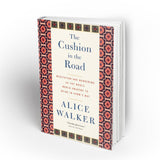 The Cushion in the Road: Meditation and Wandering as the Whole World Awakens to Being in Harm’s Way by Alice Walker - A series of essays that are stirring, inspiring, curious, surprising. While not a “food” book, she writes passionately about the need to be awake and informed, how many of us were awakened by Monsanto and their seed domination. To be awake is to then be aware, and from that stems thoughtful, mindful actions.
The Cushion in the Road: Meditation and Wandering as the Whole World Awakens to Being in Harm’s Way by Alice Walker - A series of essays that are stirring, inspiring, curious, surprising. While not a “food” book, she writes passionately about the need to be awake and informed, how many of us were awakened by Monsanto and their seed domination. To be awake is to then be aware, and from that stems thoughtful, mindful actions.
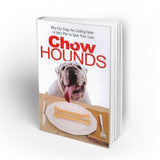 Chow Hounds: Why our Dogs Are Getting Fatter by Ernie Ward, D.V.M - With almost half the dogs in the US considered overweight or obese, with cancer the number one killer of dogs, how and what we feed our canines is incredibly important. My dogs have really enjoyed some of his recipes for home made meals (the herring and kale with pumpkin and blueberries is a big hit). The book has excellent sections on how specific ingredients (sugar, fat, and salt) make dogs overeat, deciphering food labels, and how to make healthy meals at home.
Chow Hounds: Why our Dogs Are Getting Fatter by Ernie Ward, D.V.M - With almost half the dogs in the US considered overweight or obese, with cancer the number one killer of dogs, how and what we feed our canines is incredibly important. My dogs have really enjoyed some of his recipes for home made meals (the herring and kale with pumpkin and blueberries is a big hit). The book has excellent sections on how specific ingredients (sugar, fat, and salt) make dogs overeat, deciphering food labels, and how to make healthy meals at home.
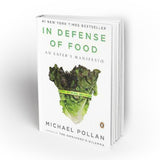 In Defense of Food: An Eater’s Manifesto by Michael Pollan - This is required reading at BioStar because it highlights that so much of what we eat isn’t food, but food-products that are far removed from the real food our grandparents ate. As the author points out: food that has to be fortified isn’t real food!
In Defense of Food: An Eater’s Manifesto by Michael Pollan - This is required reading at BioStar because it highlights that so much of what we eat isn’t food, but food-products that are far removed from the real food our grandparents ate. As the author points out: food that has to be fortified isn’t real food!
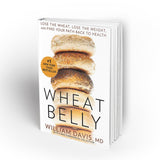 Wheat Belly: Lose the Wheat, Lose the Weight, and Find Your Path Back to Health by William Davis MD - This book had a powerful impact on me, as I learned how wheat has been bred to raise amylopectin concentrates, which stimulate the morphine receptors in our brain. No wonder I loved pasta and bread! Having gone wheat free, I feel so much better.
Wheat Belly: Lose the Wheat, Lose the Weight, and Find Your Path Back to Health by William Davis MD - This book had a powerful impact on me, as I learned how wheat has been bred to raise amylopectin concentrates, which stimulate the morphine receptors in our brain. No wonder I loved pasta and bread! Having gone wheat free, I feel so much better.
 Food, Inc: A Participant Guide to How Industrial Food is Making Us Sicker, Fatter, and Poorer and What You Can Do About It by Karl Weber - This is the companion book to the documentary, Food, Inc. If you haven’t seen the film, then you will want to read these essays of ways we can change our current food system. The documentary is a must-see for all BioStar employees.
Food, Inc: A Participant Guide to How Industrial Food is Making Us Sicker, Fatter, and Poorer and What You Can Do About It by Karl Weber - This is the companion book to the documentary, Food, Inc. If you haven’t seen the film, then you will want to read these essays of ways we can change our current food system. The documentary is a must-see for all BioStar employees.
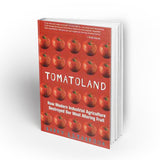 Tomatoland: How Modern Industrial Agriculture Destroyed Our Most Alluring Fruit by Barry Estabrook - Also required reading of every BioStar employee. The book traces the sad, tasteless life of the mass-produced tomato: from the chemical cocktails used to raise tomatoes, to the ethylene gas to turn them red. The book also exposes the slave trade of migrant workers in Florida. Once you read this, you will never buy a grocery store tomato again.
Tomatoland: How Modern Industrial Agriculture Destroyed Our Most Alluring Fruit by Barry Estabrook - Also required reading of every BioStar employee. The book traces the sad, tasteless life of the mass-produced tomato: from the chemical cocktails used to raise tomatoes, to the ethylene gas to turn them red. The book also exposes the slave trade of migrant workers in Florida. Once you read this, you will never buy a grocery store tomato again.
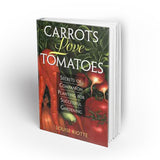 Carrots Love Tomatoes: Secrets of Companion Planting for Successful Gardening by Louise Riotte - This is a must-read for anyone that has or wants to plant vegetables. Who knew radishes love squash? Or that carrots and onions want to be next to tomatoes? Following the companion planting of this book, increased the yield in my garden significantly.
Carrots Love Tomatoes: Secrets of Companion Planting for Successful Gardening by Louise Riotte - This is a must-read for anyone that has or wants to plant vegetables. Who knew radishes love squash? Or that carrots and onions want to be next to tomatoes? Following the companion planting of this book, increased the yield in my garden significantly.
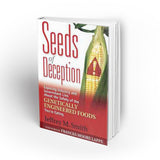 Seeds of Deception: Exposing Industry and Government Lies About the Safety of Genetically Engineered Foods You’re Eating by Jaffrey M. Smith - The author was a former executive with the leading independent laboratory testing for GM presence in foods. His experience with corporate influence and government collusion on the safety of GMO foods is not to be understated. After Mr. Smith left his position he felt compelled to expose the machinations and dangers of GMO foods.
Seeds of Deception: Exposing Industry and Government Lies About the Safety of Genetically Engineered Foods You’re Eating by Jaffrey M. Smith - The author was a former executive with the leading independent laboratory testing for GM presence in foods. His experience with corporate influence and government collusion on the safety of GMO foods is not to be understated. After Mr. Smith left his position he felt compelled to expose the machinations and dangers of GMO foods.
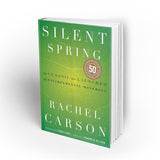 Silent Spring by Rachel Carson - Tigger was first introduced to this book in the seventh grade, and it planted the seeds of environmentalism. This book was instrumental in bringing about the banning of DDT.
Silent Spring by Rachel Carson - Tigger was first introduced to this book in the seventh grade, and it planted the seeds of environmentalism. This book was instrumental in bringing about the banning of DDT.
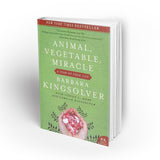 Animal, Vegetable, Miracle: A Year of Food Life by Barbara Kingsolver - Well-known author Barbara Kingsolver and her family abandoned the industrial food pipeline to spend a year growing and living off their own food. A really powerful story.
Animal, Vegetable, Miracle: A Year of Food Life by Barbara Kingsolver - Well-known author Barbara Kingsolver and her family abandoned the industrial food pipeline to spend a year growing and living off their own food. A really powerful story.
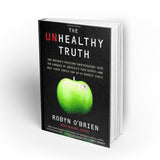 The Unhealthy Truth: One Mother’s Shocking Investigation into the Dangers of America’s Food Supply, and What Every Family Can Do to Protect Itself by Robyn O’Brien - This mother from a conservative family became a crusader when she linked a violent allergic reaction in her daughter to the hidden toxins in food.
The Unhealthy Truth: One Mother’s Shocking Investigation into the Dangers of America’s Food Supply, and What Every Family Can Do to Protect Itself by Robyn O’Brien - This mother from a conservative family became a crusader when she linked a violent allergic reaction in her daughter to the hidden toxins in food.
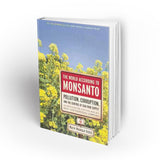 The World According to Monsanto: Pollution, Corruption and the Control of our Food Supply by Marie-Monique Robin - To understand how our food supply became controlled by a few large corporations, one must understand the role and power played by Monsanto and why this company is a serious threat to plant diversity and health.
The World According to Monsanto: Pollution, Corruption and the Control of our Food Supply by Marie-Monique Robin - To understand how our food supply became controlled by a few large corporations, one must understand the role and power played by Monsanto and why this company is a serious threat to plant diversity and health.
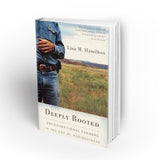 Deeply Rooted: Unconventional Farmers in the Age of Agribusiness by Lisa M. Hamilton - A fascinating journey into the lives of three farmers: an African-American dairyman in Texas, a tenth-generation rancher in New Mexico, and a family in North Dakota breeding heirloom vegetables. An amazing look at farmers not following the industrial food system.
Deeply Rooted: Unconventional Farmers in the Age of Agribusiness by Lisa M. Hamilton - A fascinating journey into the lives of three farmers: an African-American dairyman in Texas, a tenth-generation rancher in New Mexico, and a family in North Dakota breeding heirloom vegetables. An amazing look at farmers not following the industrial food system.
 Taste, Memory: Forgotten Foods, Lost Flavors, and Why They Matter by David Buckanan - This is the true story of one man’s search for some of the lost apple varieties in America. By the 19th century the U.S was the largest producer of apples, growing an incredible 2,500 varieties of apples. Today we are down to 100 varieties, and 15 of those varieties make up 90% of the apples cultivated. You will come to view apples in a whole new light.
Taste, Memory: Forgotten Foods, Lost Flavors, and Why They Matter by David Buckanan - This is the true story of one man’s search for some of the lost apple varieties in America. By the 19th century the U.S was the largest producer of apples, growing an incredible 2,500 varieties of apples. Today we are down to 100 varieties, and 15 of those varieties make up 90% of the apples cultivated. You will come to view apples in a whole new light.
 The Town That Food Saved: How One Community Found Vitality in Local Food by Ben Hewitt - This is the true story of Hardwick, Vermont who jumped started its economy through a local and self-sustaining food system that included restaurants, farmers, seed-growers, and artisanal food makers. Lots of fascinating characters and a blueprint for what towns can do.
The Town That Food Saved: How One Community Found Vitality in Local Food by Ben Hewitt - This is the true story of Hardwick, Vermont who jumped started its economy through a local and self-sustaining food system that included restaurants, farmers, seed-growers, and artisanal food makers. Lots of fascinating characters and a blueprint for what towns can do.
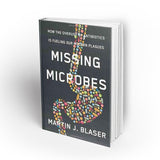 Missing Microbes: How the Overuse of Antibiotics is Fueling Our Modern Plagues by Martin J. Blaser - This book traces one scientist’s journey towards understanding the crucial importance of the microbiome, and the powerful damage of antibiotic overuse on our health. Dr. Blaser is a kind of Indiana Jones of the microbiome, making for an easy to read, and fascinating look at the role microbes play in our lives.
Missing Microbes: How the Overuse of Antibiotics is Fueling Our Modern Plagues by Martin J. Blaser - This book traces one scientist’s journey towards understanding the crucial importance of the microbiome, and the powerful damage of antibiotic overuse on our health. Dr. Blaser is a kind of Indiana Jones of the microbiome, making for an easy to read, and fascinating look at the role microbes play in our lives.
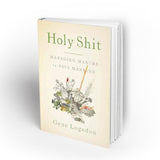 Holy Shit: Managing Manure to Save Mankind by Gene Logsdon - This entertaining book about manure features everything from how to select the right pitchfork to how to compost dog and cat waste. Helpful advice on the management of farm manure and why manure is one of our greatest natural resources.
Holy Shit: Managing Manure to Save Mankind by Gene Logsdon - This entertaining book about manure features everything from how to select the right pitchfork to how to compost dog and cat waste. Helpful advice on the management of farm manure and why manure is one of our greatest natural resources.
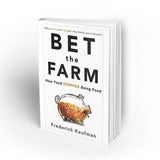 Bet the Farm: How Food Stopped Being Food by Frederick Kaufman - A fascinating journey into the connection between global food and global finance and how during record harvests (2008, 2010) more people starved than ever before, many of them farmers. Fast-paced, and easy to read, the author highlights global foods such as pizza and how these foods become both unsustainable and unhealthy.
Bet the Farm: How Food Stopped Being Food by Frederick Kaufman - A fascinating journey into the connection between global food and global finance and how during record harvests (2008, 2010) more people starved than ever before, many of them farmers. Fast-paced, and easy to read, the author highlights global foods such as pizza and how these foods become both unsustainable and unhealthy.
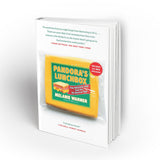 Pandora’s Lunchbox by Melanie Warner - This is the story of food processing: how cereals and common grocery-store food items are made, including how natural and artificial flavors are created to make us eat more food. Easy to read and a real eye-opener.
Pandora’s Lunchbox by Melanie Warner - This is the story of food processing: how cereals and common grocery-store food items are made, including how natural and artificial flavors are created to make us eat more food. Easy to read and a real eye-opener.
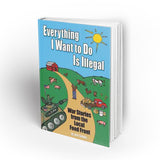 Everything I Want To Do is Illegal: War Stories from the Local Food Front by Joel Salatin - This is a book written by one of the heroes of the local food movement. He is one of the leaders in bio-diversity farming, will make you laugh, and all the while want to beat your head against the wall at the stupidity of some of the bureaucratic government regulations.
Everything I Want To Do is Illegal: War Stories from the Local Food Front by Joel Salatin - This is a book written by one of the heroes of the local food movement. He is one of the leaders in bio-diversity farming, will make you laugh, and all the while want to beat your head against the wall at the stupidity of some of the bureaucratic government regulations.
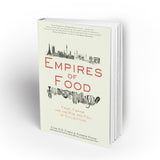 Empires of Food: Feast, Famine, and the Rise and Fall of Civilizations by Evan D.G. Frase and Andrew Rimas - If you enjoy history, this is a chronicle of the fate of people and societies for the past 12,000 years through the food they hunted, grew, traded, and ate. It also brings to light the dangers of a monolistic food system, and shows what can happen to civilizations that centralize and monopolize food. This is a blue-print for what could happen to us.
Empires of Food: Feast, Famine, and the Rise and Fall of Civilizations by Evan D.G. Frase and Andrew Rimas - If you enjoy history, this is a chronicle of the fate of people and societies for the past 12,000 years through the food they hunted, grew, traded, and ate. It also brings to light the dangers of a monolistic food system, and shows what can happen to civilizations that centralize and monopolize food. This is a blue-print for what could happen to us.



